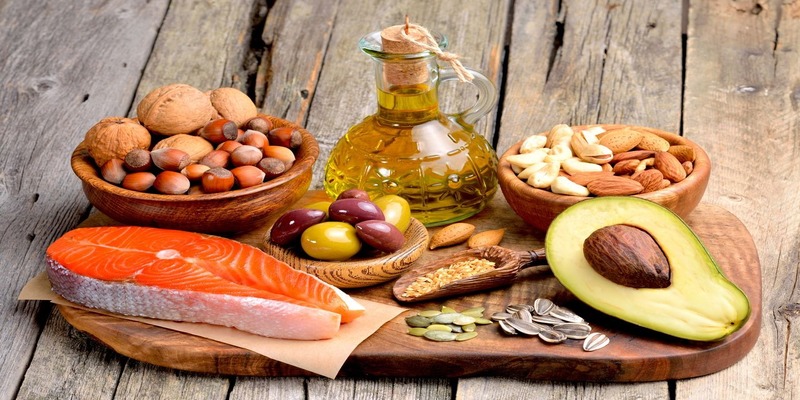Once thought to be a significant cause of cardiovascular disease, dietary fat has been discovered to affect health positively. However, the American Heart Association suggests consuming no more than 10% of your daily calories from saturated fat.
However, the saturated fats in dairy products, for example, may not have the same harmful effects as the saturated fats in red meat. Full-fat foods may nevertheless have advantages over their lower- or no-fat versions. They often have fewer added sugars and fewer carbohydrates because of this.
Avocados

Avocados don't have any close relatives among other fruit. Unlike most fruits, which are mainly composed of carbohydrates, avocados primarily comprise fats. Regarding calories, avocados are considerably higher in fat than most animal meals, consisting of around 80% fat.
A 5-ounce serving of avocados contains 15% of the DV for potassium, making them a top-tier dietary source of this mineral. Moreover, they contain several chemicals that can help prevent cell damage.
Also, eating one avocado every day for five weeks was found to have a beneficial effect on cholesterol levels in research, including 45 men and women. Moreover, they contain a lot of fiber, which helps with digestion, cardiovascular health, and weight control.
Cheese
Despite its questionable reputation, cheese is relatively healthy. It includes various nutrients, including the essential minerals calcium, phosphorus, and selenium, and the essential vitamin B12.
Cheese is extremely high in protein; one ounce of cheese has 6 grams of protein, almost as much as a glass of milk. Contrary to popular belief, cheese and other high-fat dairy products do not appear to raise heart disease risk compared to reduced-fat dairy.
A Dark Chocolate Bar
Dark chocolate is a delicious and healthy snack. About 65% of the calories come from fat, making it extremely heavy in fat. Some people may have trouble obtaining enough iron and magnesium, yet these are two significant nutrients in dark chocolate.
It's rich in antioxidants, including resveratrol and epicatechin, which have been hypothesized to have anti-aging and performance-enhancing qualities. Selecting dark chocolate with at least 70% cocoa is crucial since less cocoa content means less beneficial nutrients and antioxidants.
Complete Eggs
The high cholesterol and fat content of egg yolks led to their historic stigma as a potentially harmful component of whole eggs. But recent research has demonstrated that egg cholesterol has no detrimental effect on blood cholesterol levels.
The vitamin and mineral content of eggs is rather extensive. Choline is one example of a brain-essential vitamin in which 90% of the population is deficient. There is 27% of the Daily Value for choline in one egg.
Eggs are another meal that might help you lose weight. They can aid in satiety between meals and calorie restriction due to their high protein content. The egg, yolk, and all, is a nutritious food choices.
Fatty Fish
Many people believe that fatty fish is the healthiest and most healthy way to get protein from fish. This group of fish includes the likes of salmon, trout, mackerel, sardines, and herring.
Omega-3 fatty acids, high-quality proteins, and essential vitamins and minerals may all be abundant in this fish. Consuming fatty fish has improved cognitive performance, aids blood sugar regulation, and lowers the chance of developing heart disease.
You may benefit from a fish oil supplement if you cannot consume fish. The finest cod liver oil comes from cod. It has a sufficient amount of vitamin D and omega-3 fatty acids.
Nuts

Raw nuts are the healthiest option. They are an excellent source of plant-based protein and nourishing lipids. Most individuals don't receive enough of the mineral magnesium, which is abundant in nuts.
People who regularly consume nuts are shown to be healthier and less likely to develop a variety of illnesses. Some examples include cardiovascular disease and type 2 diabetes. Various nuts, such as almonds, walnuts, macadamias, and many more, are nutritious.
Chia Seeds
When most people think of "fatty" foods, chia seeds probably don't come to mind. However, 11 grams of fat can be found in just one ounce of chia seeds. In addition, practically all of the carbohydrates in chia seeds are fiber.
Therefore the fat makes up the bulk of the seeds' caloric content. However, they aren't any old fats. The omega-3 fatty acid alpha-linolenic acid makes up the bulk of the fat content of chia seeds, which is good for your heart.
Potential health advantages of chia seeds include reducing blood pressure and reducing inflammation. And they pack a serious nutritional punch, too. Chia seeds are a nutritious powerhouse with a wide variety of beneficial compounds in addition to their abundant fiber and omega-3 content.

It Would Be Best If You Kept In Mind Menopause Causes A Jump In Cholesterol
Nov 02, 2023

Health Benefits of Pumpkin Seeds, According To Science
Nov 11, 2023

An Overview of Heart Failure
Oct 27, 2023

What Is The Duration Of A Sinus Infection?
Feb 18, 2024

Top 4 Best Collagen Supplements
Jan 25, 2024

The Cause Of Our Constant Sneezing
Oct 26, 2023

5 Anxiety-Reducing Breathing Exercises
Feb 28, 2024

How Long Does The Flu Shot Take To Start Working?
Jan 30, 2024



